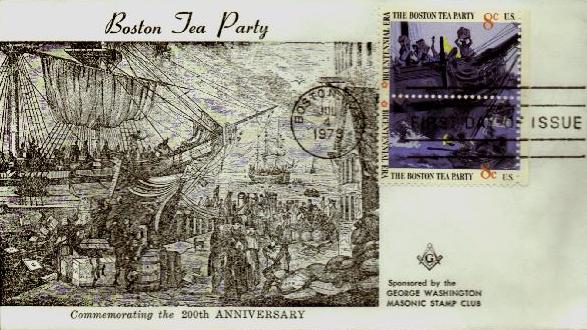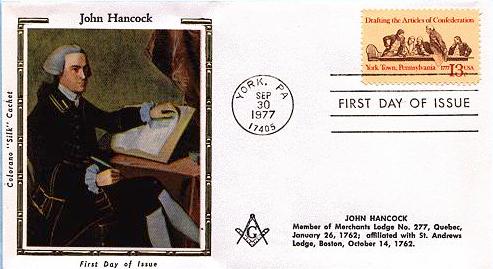"The
Revolutionary War and Our Founding Fathers" Masonic FDC's

The Boston
Tea Party - 200th Anniversary
In the face of
widespread boycotts of British goods in the Colonies and increasing violent
opposition to Parliament's authority in America, Britian had, by the early
1770's, repealed the Stamp Act of 1765 and all of the Townshend duties of
1767, except the tax on tea, which it retained as a symbol of its
unrelinquished authority to tax the Colonies. To help the foundering
East India Company dispose of its huge tea surpluses, Parliament, in 1773,
some half a million pounds of surplus tea (also alleged to have been spoiled)
were shipped to the Colonies, and the opponents of British authority were
ready for action. In Philadelphia and New York, merchants refused to
accept the taxed tea, while in Charleston it was unloaded but stored in
warehouses. In Boston the captains of three tea-laden vessels agreed not
to attempt to unload their cargoes, but the Crown-appointed governor refused
to let them leave Boston harbor unless the import duty was first paid.
The ships remained at anchor in the harbor until December 16, 1773, when some
60 members of the radical Sons of Liberty, dressed as Mohawk Indians, boarded
the ships and dumped 342 chests of tea overboard--to the delight of crowds
watching from shore. In retaliation Parliament passed the Boston Port
Act, closing the harbor. The net result of the Boston Rea Party, and the
subsequent British punitive measures, was to unify the Colonies against
British rule, hastening the outbreak of the Revolutionary War.


John Hancock
- Signer of the Declaration of Independence
Member of
Merchants Lodge No. 277, Quebec, January 26, 1762; affiliated with St. Andrews
Lodge, Boston, October 14, 1762. John Hancock's famous signature on the
Declaration of Independence is an accurate reflection of the man himself;
bold, self-promoting and vainglorious. During his lifetime he combined a
reputation for patriotism and pettiness that confounded his critics and
admirers alike. Although at 28 he was Boston's richest man, with
interests in shipping and real estate, he risked all, first by identifying
himself with such radicals as Samuel Adams and later by his wholehearted
support of rebellion against Britain. Hancock was born in Massachusetts
in 1737. After his father's death he was adopted, as a child, by his
uncle Thomas, a wealthy Boston merchant whose business he entered after
graduating from Harvard in 1754. By 1765 Hancock was in the thick of the
struggle against British taxation. His refusal, in 1768, to allow royal
inspectors aboard his ship, the Liberty, brought about the seizure of
the vessel followed by a riot in Boston. Hancock's defiance of the
British won him great popularity, and in 1769 he was elected to the
Massachusetts General Court. Six years later Hancock was a delegate to
the second Continental Congress and served as its President in 1775 and
1776. It was in this role that he became the first signer of the
Declaration of Independence.

